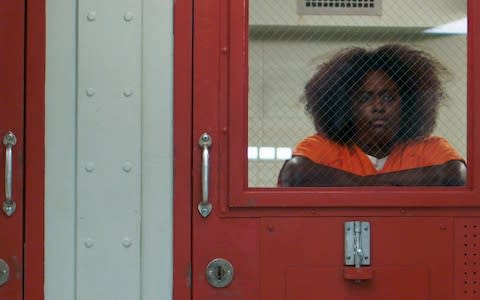Orange Is the New Black, season 6 review: uneven, brilliant, messy and poignant – this prison drama is still worth watching
It’s been five years since Orange is the New Black arrived on Netflix, ushering in a new era of diverse, female-led ensemble drama. But on the inside of Litchfield women’s prison only a year has passed for the inmates. The previous season took place over a mere three days, when the prison became gripped in a riot prompted by the death of fan-favourite Poussey (played by the still-missed Samira Wiley).
Time moves faster in this new 13-part run, though it’s not always easy to tell – and surely, in real life, only prison can rival the dullest school lessons when it comes to the agonisingly slow passage of time. But, for those trying to keep track, the progression of inmate Lorna’s (Yael Stone) pregnancy acts as a useful calendar.
The sixth season picks up exactly where the last left off, with a core group of inmates who had been hiding in a derelict area of the prison being dragged out by the team of armed officers who had just inadvertently shot and killed the sadistic warden Piscatella (Brad William Henke).
Vindication and justice is rarely easy to come by in Litchfield – and certainly not where the inmates are concerned. They almost always come out worse off (the incarceration of the perverted guard “Pornstache” is one rare exception). So there’s no surprise that we return to find that the authorities are desperate to regain control of both the prison and the ensuing PR disaster by any means possible. We’re not in the comparative calm of minimum security any longer.
Disappointingly, some well-liked recurring characters from the previous series (Big Boo, Maritza and Janelle among them) are reduced to either blink-and-you’ll-miss-them cameos or disappear entirely as they’re sent away, off-screen, to a different prison. The rest, including our original middle-class inmate Piper (Taylor Schilling), are hoisted into Litchfield’s maximum security wing and segregated while a few steely-faced officials try to figure out what the hell went on – and who they can blame.

Last season, the finest moments came with Taystee’s (the brilliant Danielle Brooks) battle to see justice for her friend Poussey, who had been accidentally killed by a guard, only for it to be hushed up by the private company that manages the prison. A marvellous combination of toughness, pragmatism, wit and effervescence, Taystee – rather than Piper – has become the heart and soul of the series. Her fight expands in this run, but she’s infuriatingly underused. And this year, perhaps as a result of her limited screen time, the writers do a less effective job of writing her dialogue how she would speak it rather than putting their own, occasionally overly didactic, words in her mouth.
Instead time is given over to getting to know the existing inmates in the maximum security wing. And though they are a mixed bunch, none stand out. The hard-talking big-shots of the two warring blocks, run by a pair of estranged middle-aged sisters (played by Henny Russell and Mackenzie Phillips), offer a few neat twists but the ongoing battle between the two is mostly standard prison-drama fare (overreacting to minor slights, getting all puffed up over loyalty and ingenious attempts to smuggle in contraband).
How the Orange is the New Black inmates ended up in prison
While the past two seasons got progressively darker, they also tended to sag in the middle episodes, and that has never been more true than here. Once the shift to maximum security has been established, we’re back in the rotating cast of quips and menacing snarls – it's often messy and uneven. There are some moments of classic OITNB brilliance, both through slapstick humour and poignancy, and it’s always a pleasure to spend time with the superbly fleshed-out existing characters like Red (Kate Mulgrew), Nicky (Natasha Lyonne), Gloria (Selenis Leyva) and Cindy (Adrienne C Moore), But, given the high stakes at play here, the tension is frequently lacking.
Each series has, however, always managed to close out on a jaw-dropper, and those moments have progressed from uplifting and triumphant to purely shocking. Though episode 13 yanks hard at the heartstrings and elicits a quiet horror, while casting a swipe at the most current social issues in the US, it doesn’t deliver the same wallop of the former two seasons. There’s at least one more season yet to come (the show was recommissioned for a fifth, sixth and seventh in 2016), and there’s enough set-up to offer yet another new direction for the story to take. But, really, there’s probably not enough life left here to carry it any further than that. So let’s hope Orange Is the New Black goes out on a high.
Season six of Orange Is the New Black arrives on Netflix today
